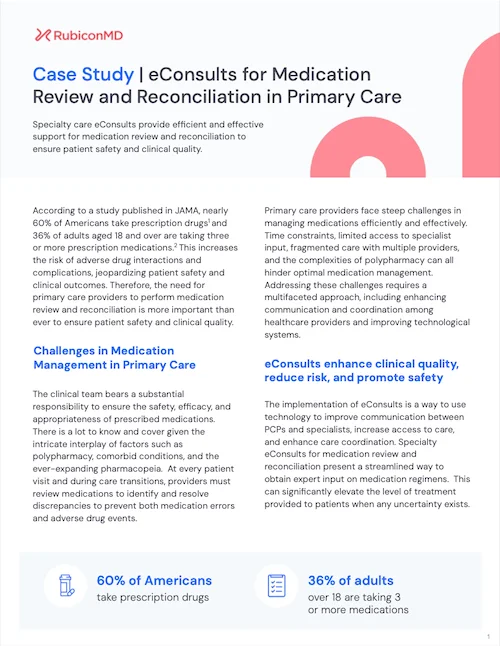Building eConsult Programs Aligned to Quality Initiatives for More Effective Value-Based Care
As primary care providers and health systems transition from traditional fee-for-service models to value-based care (VBC), eConsults are a scalable,…
In the ever-evolving landscape of primary care, the integration of technology has been pivotal in enhancing patient care and improving efficiency. In the past two years, the pre-referral electronic consultation (eConsult) has emerged to further improve the primary care and specialty care relationship. eConsults can facilitate a digital dialogue between primary care physicians (PCPs) and specialists before an in-person referral. They are a critical tool in optimizing patient care plans, reducing unnecessary referrals, and making specialty care more accessible.
Below we dive into the reasons, backed by research and real-world applications, that showcase why this approach is effective and may become the standard of care in coming years.
One of the most significant benefits of pre-referral eConsults is their ability to reduce unnecessary patient referrals to specialists. Studies have shown that a substantial proportion of specialty referrals can be avoided through effective pre-referral consultations. RubiconMD data of over 300,000 eConsults shows that eConsults lead to an avoided referral ~ 70% of the time. This helps to improve the speed to care for patients who truly need an in-person specialist visit and alleviates the burden on healthcare systems associated with unnecessary services.
Healthcare costs are a concern for patients, providers, and payers alike. By minimizing unnecessary referrals, eConsults inherently contribute to lowering healthcare costs. The cost-effectiveness of eConsults stems from the reduction in unnecessary diagnostic tests, specialist visits, and hospital admissions. With specialists able to offer advice and management plans through eConsults, many issues can be resolved without the need for more expensive, in-person specialist visits. Further, patients get the care they need faster, through their PCP. Research published in the Journal of the American Medical Association highlights that eConsult platforms can lead to significant cost savings for healthcare systems by streamlining the referral process and optimizing resource utilization.
Access to specialist care is a significant hurdle for many patients. For instance, those residing in underserved or rural areas and individuals facing financial constraints, mobility limitations, or transportation issues may encounter obstacles preventing them from attending specialist appointments. eConsults bridge this gap by allowing PCPs to seek specialist advice on behalf of the patient, without the need for an in-person visit. A study in the Annals of Family Medicine found that eConsults significantly improved access to specialty care for patients in remote areas. This underscores the potential of technology to democratize healthcare access. eConsults provide accessible specialty care as it can be completed rapidly, much faster than waiting for an in-person appointment. It makes a profound impact on patient care accessibility, offering a more equitable healthcare system for all.
Pre-referral eConsults contribute to better patient outcomes by ensuring timely and appropriate specialist input into patient care plans. This collaborative approach allows for more accurate and expeditious diagnoses, more effective treatment plans, and improved management of chronic conditions. Evidence from Health Affairs suggests that eConsults can lead to improved disease management and patient outcomes by facilitating early specialist involvement in patient care. With faster access to specialist advice, PCPs can make more informed decisions about patient care, leading to better outcomes. Research supports this, showing that eConsults can enhance the quality of care by ensuring patients receive the most appropriate treatment plans, tailored by specialist input.
A frequent healthcare challenge is the siloed nature of communication between primary care and specialists. The traditional referral process can often be fraught with communication challenges. eConsults offer a streamlined, secure platform for PCPs and specialists to collaborate and share patient information. This enhanced communication ensures that specialists comprehensively understand the patient’s condition before any in-person visit, leading to more efficient and effective patient care.
Pre-referral eConsults break down barriers, facilitating direct and efficient communication and speed up the decision-making process to ensure that patient care is coordinated and comprehensive, with all providers on the same page.
Lastly, eConsults empower PCPs by providing them with direct access to specialist advice. This not only enhances the PCP’s ability to manage complex cases but also contributes to their professional development by expanding their knowledge base. A study in the Journal of General Internal Medicine highlighted the educational benefits of eConsults for PCPs, noting an improvement in their ability to manage similar cases independently in the future.
In conclusion, pre-referral eConsults represent a significant advancement in the way primary care and specialist services are delivered. By reducing unnecessary referrals, lowering healthcare costs, enhancing access to specialty care, improving patient outcomes, streamlining communication, and empowering PCPs, eConsults are proving to be an indispensable tool in the quest for a more efficient, accessible, and high-quality healthcare system. As technology continues to evolve, the adoption and integration of eConsults into standard healthcare practices are poised to redefine the future of patient care.
To explore RubiconMD eConsult solutions – schedule a demo or contact us today.
As primary care providers and health systems transition from traditional fee-for-service models to value-based care (VBC), eConsults are a scalable,…
Access to specialty care shouldn’t depend on your zip code, insurance type, or income level—but for Medicaid patients, it often…
In recent years, eConsults have emerged as an impactful tool for health plans to increase value and lower specialty care…

Explore real examples of specialty care eConsults providing efficient and effective support for medication review and reconciliation.